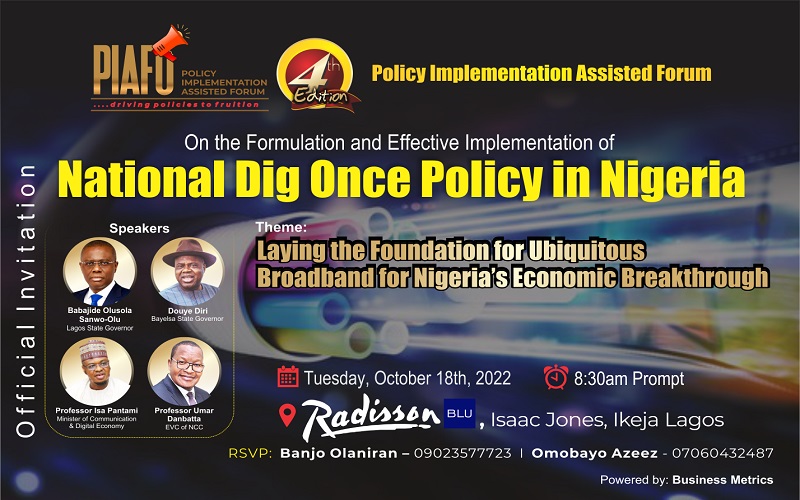Organisers of the Policy Implementation Assisted Forum (PIAFo) have concluded plans to dissect issues around the formulation and effective implementation of the National Dig Once Policy in Nigeria to boost fibre deployment across the country.
The summit, powered by Business Metrics Nigeria, is slated for Tuesday, October 18, 2022, at Radisson Blu Hotel, GRA, Ikeja Lagos, with the theme: Laying the Foundation for Ubiquitous Broadband for Nigeria’s Economic Breakthrough.
To lead the Dialogue, Professor Isa Pantami, the Minister of Communications and Digital Economy, is billed to deliver the keynote address, while Professor Umar Danbatta, the Executive Vice Chairman of the Nigerian Communications Commission will also deliver a paper on a related topic.
According to the forum organisers, which is now in its fourth edition, implementing a National Dig Once Policy will give Nigeria the footing required to deliver last-mile broadband infrastructure to every part of the country.
The objective of a Dig Once Policy is to facilitate the provision of ready-made buried conduits across the country to allow seamless fibre deployment by reducing costs and removing unnecessary duplication.
Fibre is a critical element of the backbone infrastructure for broadband and connectivity in pursuit of Nigeria’s digital economy.
Interestingly, the policy has become inevitable to meet the targets set by the Federal Government in its National Broadband Plan (NBP) 2020-2025, wherein the country targets 40% and 60% fibre to towers by 2023 and 2025 respectively from a paltry 10% in 2020.
The Plan further seeks to attain 90,000km and 120,000km of non-overlapping fibre infrastructure by 2023 and 2025 respectively from just 40,000km in 2020.
Meanwhile, the Nigerian Communications Commission (NCC) reported that as of the end of 2021, total fibre Optics so far deployed in Nigeria stood at 74,947km, including 47,128.7km on-land and 27,818.3km submarine
However, by meeting the NBP targets through initiatives such as the Dig Once Policy, public institutions such as schools and hospitals and private enterprises in the country’s 774 local governments can be easily connected to broadband and enjoy internet speed of up to 25 megabytes per second in the urban and 10 megabytes per second in rural areas by 2025.
Government intends to deliver this to 95% of the local government areas through fibre, leveraging satellite technology for the remaining 5%.
“We believe these targets and the possibility of a smart city can only come to fruition through collaborative efforts among federal, state, local government authorities and private sector players. This is what the Dig Once Policy Intends to achieve,” says Omobayo Azeez, PIAFo Lead Executive and Editor of Business Metrics.
“We have dedicated this edition of the summit to dialogue around the Dig Once Policy to contribute to the formulation of the policy and ensure that those who have roles to play in implementing are carried along to create awareness and understanding as well as eliminate possibilities of revolt against the policy,” he added.
Azeez said expected speakers and guests at the summit include governors, the leadership of the Nigeria Governors’ Forum (NGF), telecom operators, undersea cable operators, Galaxy Backbone, Infrastructure Concession Regulatory Agency, Lagos State Infrastructure Maintenance and Regulatory Agency, Broadband Implementation Steering Committee, and Association of Local Governments of Nigeria, among others.
He further stated that the event is endorsed by the Association of Telecommunication Companies of Nigeria (ATCON), the Association of Licensed Telecoms Operators of Nigeria (ALTON), and the Nigeria Internet Group (NIG) whose chiefs and members would also be participating in the event.
“BusinessMetrics has created the PIAFo initiative as a mid-point dialogue platform among stakeholders for policy advocacy, implementation and assessment across various sectors,” he concluded.

